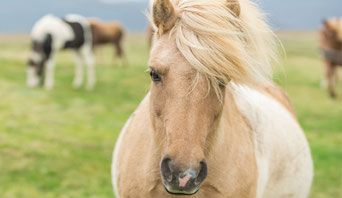8 New Equine, Alpaca Studies Receive Funding
The studies range from preventing foal pneumonia to identifying better treatments for equine asthma.

Eight researchers at 7 universities are celebrating this week after receiving grants from Morris Animal Foundation for their large companion animal research studies. The foundation awarded grants totaling almost $750,000 to these researchers in Morris Animal’s first round of large animal funding for 2018.
“We were very impressed with the quality of research proposals we received this year,” Kelly Diehl, DVM, DACVIM (SAIM), senior scientific and communications adviser at Morris Animal Foundation, said, “particularly in areas of equine health where we can make a significant improvement in the well-being of our horse companions.”
RELATED:
- A Promising Novel Treatment for Equine Herpesvirus Myeloencephalopathy
- Largest Interventional Canine Clinical Trial Receives $6.4 Million Grant
Seven of the 8 studies focus on equine health—ranging from preventing foal pneumonia to identifying better treatments for equine asthma—and 1 study focuses on the health problems of grey alpacas.
Morris Animal Foundation provided descriptions for each of the 8 newly funded studies:
- Combating Persistent Joint Infections: Researchers from the North Carolina State University College of Veterinary Medicine will investigate a new strategy using platelet-rich plasma to improve treatment of persistent joint infections that cause inflammation and osteoarthritis in horses.
- Correlating Different Mast Cell Subtypes to Equine Asthma Diseases: Researchers from the University of Tennessee College of Veterinary Medicine will investigate differences in mast cell subtypes found in the airways of heathy and asthmatic horses to help identify better diagnostic and treatment strategies for equine asthma.
- Determining Optimal Antibiotic Dosing for Septic Foals: Researchers from the Oklahoma State University Center for Veterinary Health Sciences will determine the optimal intravenous and intra-articular dosing protocol for amikacin—an antibiotic used to treat bacterial infections in foals.
- Developing a Prevention Strategy for Foal Pneumonia: Researchers from the Texas A&M College of Veterinary Medicine and Biomedical Sciences will investigate if vaccinating mares will protect their newborn foals against pneumonia caused by the bacterium Rhodococcus equi.
- Improving Stem Cell Treatment Success: Researchers from the North Carolina State University College of Veterinary Medicine will manipulate the expression of immune markers on stem cells to develop safer and more effective therapies for horses with musculoskeletal injuries.
- Investigating Antibiotic-resistant Foal Pneumonia: Researchers from the University of Georgia College of Veterinary Medicine will investigate the mechanisms leading to the development and transmission of antimicrobial resistance in Rhodococcus equi.
- Understanding the Roles of Diet and Insulin in Horses at Risk for Laminitis: Researchers from the University of Minnesota College of Veterinary Medicine will investigate how diet influences a horse’s gut bacteria and metabolism, and how it impacts insulin to better understand how to feed horses at risk for laminitis.
- Unraveling the Genetics Behind Health Problems in Grey Alpacas: Researchers from Curtin University will study the genetic causes of health problems in grey-colored alpacas to help with the development of a genetic screening test to improve the overall health of these animals.
“Horses hold such a special place in our hearts and imaginations,” Dr. Diehl said, “and Morris Animal Foundation continues to invest in excellent science that will give them healthier, longer lives.”
Proposals are also now being accepted for the foundation’s next round of large companion animal research funding. Proposals are due July 11 and should be submitted through the online application form.